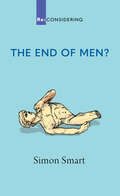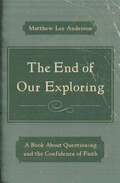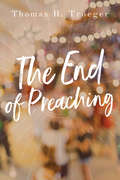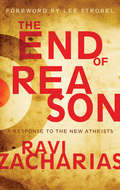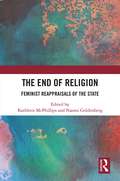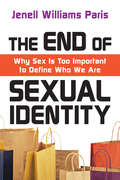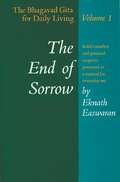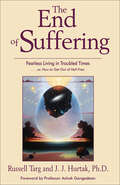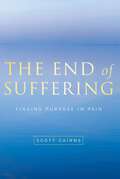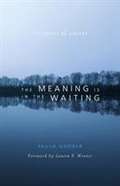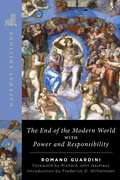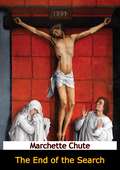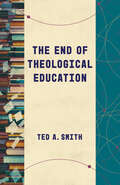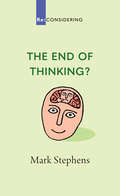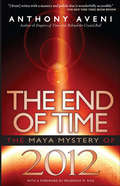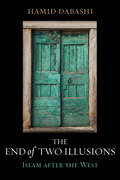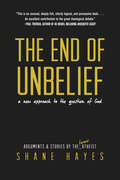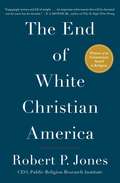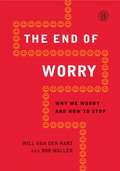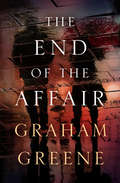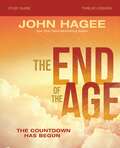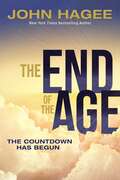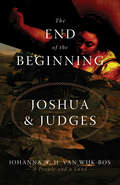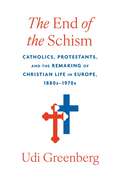- Table View
- List View
The End of Men? (Re: CONSIDERING)
by Simon SmartRe:CONSIDERING invites you to look at what’s familiar from an unfamiliar angle. To consider how we consider things – and how to do it better.What makes a good man?In this grounded, forthright and hopeful book, Simon Smart reconsiders the modern male dilemma.Models of masculinity may be less constricting than they used to be – but boys and men are confused about what’s expected of them, and it shows. In education, in mental health, in relationships, they’re struggling. And we’re all struggling to have a constructive conversation about the challenges they face.Drawing on his own experiences of schooling and fatherhood, the best contemporary research, interviews with those on the front lines of a growing crisis, as well as ancient wisdom, Simon Smart asks the question: how can we help boys become their best selves, and a gift to those around them?
The End of Our Exploring: A Book about Questioning and the Confidence of Faith
by Matthew Lee AndersonDo we know what it means to question well?We need not fear questions, but by the grace of God, we have the safety and security to rush headlong into them and find ourselves better for it on the other side.Faith isn't the sort of thing that will endure as long as our eyes are closed. The opposite is the case: Faith helps us see, and that means not shrinking from the ambiguities and the difficulties that provoke our most profound questions.In our embrace of questioning, we must learn to question well. In our uncertainty, we must not give up the task of walking worthy of the calling that Christ has placed upon us. For we have not yet reached the end of our exploring. This book is written to aid you in faithfully questioning your foundations.
The End of Our Exploring: A Book about Questioning and the Confidence of Faith
by Matthew Lee AndersonDo we know what it means to question well?We need not fear questions, but by the grace of God, we have the safety and security to rush headlong into them and find ourselves better for it on the other side.Faith isn't the sort of thing that will endure as long as our eyes are closed. The opposite is the case: Faith helps us see, and that means not shrinking from the ambiguities and the difficulties that provoke our most profound questions.In our embrace of questioning, we must learn to question well. In our uncertainty, we must not give up the task of walking worthy of the calling that Christ has placed upon us. For we have not yet reached the end of our exploring. This book is written to aid you in faithfully questioning your foundations.
The End of Preaching
by Thomas H. TroegerThe End of Preaching is equal parts instruction and inspiration, offering practical help for every preacher and seminarian, and providing a new way of thinking about the purpose and craft of preaching. Tom Troeger explores the end--or purpose--of preaching as prayer. He gently reveals layer after layer of meaning for the preacher and the practice of preaching, giving deep insight into the preacher's approach, the task of preaching itself, and the impact of preaching on the hearers. This is a book to be studied and savored, a wonderful gift for one’s self or any preacher friend.Thomas Troeger delivered the 2016 Beecher Lectures, the nation's most prestigious and influential series of lectures on the topic of preaching. The series was established at Yale University in 1871.
The End of Reason
by Ravi ZachariasWhen you pray, are you talking to a God who exists? Or is God nothing more than your “imaginary friend,” like a playmate contrived by a lonely and imaginative child? When author Sam Harris attacked Christianity in Letter to a Christian Nation, reviewers called the book “marvelous” and a generation of readers—hundreds of thousands of them—were drawn to his message. Deeply troubled, Dr. Ravi Zacharias knew that he had to respond. In The End of Reason, Zacharias underscores the dependability of the Bible along with his belief in the power and goodness of God. He confidently refutes Harris’s claims that God is nothing more than a figment of one’s imagination and that Christians regularly practice intolerance and hatred around the globe. If you found Sam Harris’s Letter to a Christian Nation compelling, the book you are holding is exactly what you need. Dr. Zacharias exposes “the utter bankruptcy of this worldview.” And if you haven’t read Harris’ book, Ravi’s response remains a powerful, passionate, irrefutably sound set of arguments for Christian thought. The clarity and hope in these pages reach out to readers who know and follow God as well as to those who reject God.
The End of Religion: Feminist Reappraisals of the State
by Kathleen McPhillipsFeminist theory has enhanced and expanded the agency, influence, status and contributions of women throughout the globe. However, feminist critical analysis has not yet examined how the assumption that religion is natural, timeless, universal and omnipresent supports sexist and race based oppression. This book proposes radical new thinking about religion in order to better comprehend and confront the systematic disempowerment of women and marginalized groups. Utilising feminist and post-colonial analysis of access, equity and violence, contributors draw on recent critical theory to collapse accepted boundaries between religion and secularity with the aim of understanding that religion is a technology of governance in its function, meaning and history. The volume includes case studies focusing on how the category of religion is deployed to perpetuate male hegemony and racist inequities in Australia, Mexico, the United States, Britain and Canada. This trenchant feminist critique and academic analysis will be of key interest to scholars and students of Religion, Sociology, Political Science and Gender Studies.
The End of Sexual Identity: Why Sex Is Too Important to Define Who We Are
by Jenell Williams ParisThe End of Sexual Identity
The End of Sorrow
by Eknath EaswaranIndia's timeless and practical scripture presented as a manual for everyday use. This is the first of three volumes and contains preface, introduction, chapters 1-6 of The Bhagavad Gita with commentary, followed by a glossary to Sanskrit terms.
The End of Suffering: Fearless Living in Troubled Time . . . or, How to Get Out of Hell Free
by Russell Targ J. J. HurtakThis spiritual inquiry into the nature of truth draws on Buddhism and quantum physics to liberate us from limited understandings of ourselves and others.The hopeful teaching of this book is that while everybody suffers, most of this suffering is unnecessary—it can be overcome. The belief that things must be either true or untrue leads us to think in terms of polarities: good or evil, right or wrong. This friend-or-foe approach may seem to make life easier, but in The End of Suffering, Russell Targ and J. J. Hurtak assert that this worldview only increases our experience of suffering.In an effort to overcome the polarity of opposites and the accompanying suffering, Targ and Hurtak combine the wisdom of the East with the findings of quantum physics, uncovering a middle ground that shows opposing sides are really the same.Buddha taught us to live a helpful and compassionate life and to surrender our ego to the peace of spaciousness. The middle path of Buddhism also shows that things may be neither true nor not true, or both true and untrue. The End of Suffering puts the perceived opposites of Buddhism and physics together, showing step-by-step how we can learn to surrender the story of who we think we are and experience an end to our suffering.
The End of Suffering: Finding Purpose in Pain (Paraclete Poetry)
by Scott Cairns"The extreme greatness of Christianity lies in the fact that it does not seek a supernatural remedy for suffering, but a supernatural use for it." –Simone Weil"Like most people I, too, have been blindsided by personal grief now and again over the years. And I have an increasingly keen sense that, wherever I am, someone nearby is suffering now. For that reason, I lately have settled in to mull the matter over, gathering my troubled wits to undertake a difficult essay, more like what we used to call an assay, really—an earnest inquiry. I am thinking of it just now as a study in suffering, by which I hope to find some sense in affliction, hoping—just as I have come to hope about experience in general—to make something of it." –from the bookIs there meaning in our afflictions? With the thoughtfulness of a pilgrim and the prose of a poet, Scott Cairns takes us on a soul-baring journey through "the puzzlement of our afflictions." Probing ancient Christian wisdom for revelation in his own pain, Cairns challenges us toward a radical revision of the full meaning and breadth of human suffering. Clear-eyed and unsparingly honest, this new addition to the literature of suffering is reminiscent of The Year of Magical Thinking as well as the works of C. S. Lewis. Cairns points us toward hope in the seasons of our afflictions, because "in those trials in our lives that we do not choose but press through—a stillness, a calm, and a hope become available to us."
The End of Suffering: Finding purpose in Pain
by Scott CairnsProbing ancient Christian wisdom for revelation in his own pain, Cairns challenges us toward a radical revision of the full meaning and breadth of human suffering. Clear-eyed and unsparingly honest, this new addition to the literature of suffering is reminiscent of The Year of Magical Thinking as well as the works of C. S. Lewis. Cairns points us toward hope in the seasons of our afflictions.
The End of The Modern World: With Power and Responsibility
by Romano GuardiniTwo monumental works on the nature of the modern age by Romano Guardini, one of the most important Catholic figures of the 20th century.This expanded edition of The End of the Modern World: A Search for Orientation includes its sequel, Power and Responsibility: A Course of Action for the New Age. In both, Guardini analyzes modern man's conception of himself in the world, and examines the nature and use of power. It is the principle of individual responsibility that weaves both works into a seamless, comprehensive, and compelling moral statement. Guardini tirelessly argues that human beings are responsible moral agents, possessed of free will, and answerable to God and their fellow man. On The End of the Modern World: "This book will cauterize the spirit of any man who reads it; it will burn away that sentimentality with which so many today view the advent of the new order, imagining – as they do – that a fully technologized universe can retain every significant cultural and traditional value sustained by the past." – Frederick D. Wilhelmsen, founding editor of Triumph magazine and professor at the University of Dallas On Power and Responsibility: "If the characteristic of Hellenic civilization is to be summed up in the word logos, the characteristic of our own is more exactly summed up in the word power. The fact itself is a challenge to the wisdom of man. One is grateful that Romano Guardini has taken up the challenge... I highly recommend the book to all who are wise enough to know today's need to wisdom. That is, I recommend the book to every thoughtful mind." – John Courtney Murray, S.J., architect of the Vatican II "Declaration on Religious Liberty" and author of We Hold These Truths
The End of The Search: Discovery And Encounter With The Divine
by Marchette ChuteWith elegant simple language, Ms. Chute sets the tone for the entire book with her interpretation of the Act of the Apostles in everyday terms. She describes "the rest of the Letters" and their authors, showing how of the move from the shadow of truth into the light of full understanding...led by their desire in search of an encounter with the Divine. Chute unlock the mystery of the Book of Revelation by giving the reader a sense of John's view of God and His relationship to man. John's summation of the Book of Revelation can be said in nine words: God is Light.God is Love. Rather like a mathematician with a single idea, John's writings are about the destruction of the darkness by the light. The Book of Revelation is a record of the destruction of darkness--now the search is ended and we may encounter the Divine. In plain language, John writes a story of mental warfare--light, which is full knowledge of God; and darkness, which is the ignorance of God. When the mental warfare is ended, we have peace. We abandon human endeavor and now know: The Kingdom of God is With You.A real and uplifting interpretation of the Book of Revelation.
The End of Theological Education (Theological Education between the Times)
by Ted A. SmithHow to envision theological education in this time between the times The dominant model of theological education is coming to an end—but Ted A. Smith looks to its ultimate ends as sources of hope and renewal.Smith locates the crisis facing theological education today in a sweeping history of religion in the United States, from the standing orders of the colonial period to the voluntary associations of the nineteenth and twentieth centuries. He then connects today&’s challenges to shifts in contemporary society, including declining religious affiliation, individualization, rising desires for authenticity, and the unraveling of professions.Smith refuses to tell the story as one of progress or decline. Instead, he puts theological education in eschatological perspective, understanding it in relation to its ultimate purpose: &“knowledge of God. . . so deep, so intimate, that it requires and accomplishes our transformation.&” This knowledge is not restricted to a professional clerical class but is given for the salvation of all. Seeing by the light of this hope, Smith calls readers to reimagine church, ministry, and theological education for this time between the times.
The End of Thinking? (Re: CONSIDERING)
by Mark StephensRe:CONSIDERING invites you to look at what’s familiar from an unfamiliar angle. To consider how we consider things – and how to do it better.What were you thinking?We all feel entitled to our opinion. Whether it be our take on politics, vaccines, parenting, or the value of religion, everybody wants to have their say – and everybody loves to be right.But do we know what it means to think well?Covering ‘idiot brain’, lobotomies, the difference between certainty and confidence, the nature of facts, and the virtue of intellectual hospitality, Mark Stephens invites you to consider not just what you think but how and why you think.Do we think only for ourselves, or also for the good of others?
The End of Time: The Maya Mystery of 2012
by Anthony AveniDecember 21, 2012. The Internet, bookshelves, and movie theaters are full of prophecies, theories, and predictions that this date marks the end of the world, or at least the end of the world as we know it. Whether the end will result from the magnentic realignment of the north and south poles, bringing floods, earthquakes, death, and destruction; or from the return of alien caretakers to enlighten or enslave us; or from a global awakening, a sudden evolution of Homo sapiens into non-corporeal beings—theories of great, impending changes abound. In The End of Time, award-winning astronomer and Maya researcher Anthony Aveni explores these theories, explains their origins, and measures them objectively against evidence unearthed by Maya archaeologists, iconographers, and epigraphers. He probes the latest information astronomers and earth scientists have gathered on the likelihood of Armageddon and the oft-proposed link between the Maya Long Count cycle and the precession of the equinoxes. He then expands on these prophecies to include the broader context of how other cultures, ancient and modern, thought about the “end of things” and speculates on why cataclysmic events in human history have such a strong appeal within American pop culture.
The End of Two Illusions: Islam after the West
by Hamid DabashiDismantling the myths that divide Islam and the West, this cutting-edge work of critical thinking proposes new ways to reread Islamic and world histories. Extending from the front-page news coverage of our daily lives back into the deepest and most revelatory histories of the last two hundred years and earlier, Hamid Dabashi's The End of Two Illusions is a daring, provocative, and groundbreaking work that dismantles the most dangerous delusions manufactured between two vastly fetishized abstractions: "Islam" and "the West." With this book, Dabashi shows how the civilizational divides imagined between these two cosmic binaries have defined their entanglement—in ways that have nothing to do with the lived experiences of either Muslims or the diverse and changing communities scarcely held together by the myth of "the West." Through detailed historical and contemporary analysis, The End of Two Illusions untangles the motivations that produced this global fiction. Dabashi demonstrates how "the West" was an ideological commodity and civilizational mantra invented during the European Enlightenment, serving as an epicenter for the rise of globalized capitalist modernity. In turn, Orientalist ideologues went around the world manufacturing equally illusory abstractions in the form of inferior civilizations in India, China, Africa, Latin America, and the Islamic world. The result was the projection of "Islam and the West" as the prototype of a civilizational hostility that has given false explanations and flawed prognoses of our contemporary history, with weaponized Islamophobia on one side and militant Islamism on the other as its most palpable manifestations. Dabashi argues it is long past time to dismantle this dangerous liaison, expose and overcome its perilous delusions, and reimagine the world beyond its shimmering mirage. The End of Two Illusions is the most iconoclastic work of critical thought and scholarship to emerge in recent memory, clearing the way toward a far more liberating imaginative geography of the world we share.
The End of Unbelief: A New Approach to the Question of God
by Shane HayesThe trend toward agnosticism, atheism, and other forms of unbelief is gathering force, especially among the young. And churches simply don't know how to counter it. This book provides the new kind of outreach needed--sophisticated, bold, and intellectually challenging.As a former atheist turned Christian, Shane Hayes offers a unique perspective for skeptics. While standard conversion literature rarely penetrates unbelievers' defenses, this book brings them to God even as their minds are slammed shut to Christ.Hayes found the direct transition from atheism to Christianity to be impossible. Instead, a period of Pure Theism occurred where Hayes took one step out of atheism towards the second step: Christ. Both steps require an acceptance of God as a personal and loving deity.The End of Unbelief serves as the response to the New Atheists and to anti-faith arguments in general. Read it and give it to the skeptic in your life.
The End of White Christian America
by Robert P. Jones&“Quite possibly the most illuminating text for this election year&” (The New York Times Book Review). *Winner of the Grawemeyer Award in Religion* Robert P. Jones, CEO of the Public Religion Research Institute, spells out the profound political and cultural consequences of a new reality—that America is no longer a majority white Christian nation. For most of our nation’s history, White Christian America (WCA) set the tone for our national policy and shaped American ideals. But especially since the 1990s, WCA has steadily lost influence, following declines within both its mainline and evangelical branches. Today, America is no longer demographically or culturally a majority white, Christian nation. Drawing on more than four decades of polling data, The End of White Christian America explains and analyzes the waning vitality of WCA. Robert P. Jones argues that the visceral nature of today’s most heated issues—the vociferous arguments around same-sex marriage and religious and sexual liberty, the rise of the Tea Party following the election of our first black president, and stark disagreements between black and white Americans over the fairness of the criminal justice system—can only be understood against the backdrop of white Christians’ anxieties as America’s racial and religious topography shifts around them. Beyond 2016, the descendants of WCA will lack the political power they once had to set the terms of the nation’s debate over values and morals and to determine election outcomes. Looking ahead, Jones forecasts the ways that they might adjust to find their place in the new America—and the consequences for us all if they don’t. “Jones’s analysis is an insightful combination of history, sociology, religious studies, and political science….This book will be of interest to a wide range of readers across the political spectrum” (Library Journal).
The End of Worry
by Rob Waller Will van der HartEasy to understand and practical, a psychiatrist and an Anglican vicar show us how to diffuse worry by offering practical solutions and long-term hope.We live in a paradox: While life has never been safer statistically, worry has reached epidemic proportions. So what has gone wrong? Many Christians suffer in silence, unsure whether to turn to psychological solutions or biblical teaching. Now, in The End of Worry, these people have a fresh solution. Integrating cutting-edge psychology and orthodox theology, William van der Hart and Rob Waller explain why simply having more faith and trusting in God is only part of the solution to worrying. The authors approach worry as a process rather than a feeling, and produce proven techniques for retraining worrisome thought patterns. By exploring concrete concepts such as "worry rules" and "four worry themes," the authors provide readers with an understanding of why they worry, how it affects them and their problem, and how to break the cycle of worrying altogether. From tolerating uncertainty to the role of faith in worrying (for better or worse), the wide-ranging insights in these pages offer real relief for everyone who has ever looked for a way out of their own worries.
The End of the Affair (Virago Modern Classics #Vol. 13)
by Graham GreeneGraham Greene&’s masterful novel of love and betrayal in World War II London is &“undeniably a major work of art&” (The New Yorker). Maurice Bendrix, a writer in Clapham during the Blitz, develops an acquaintance with Sarah Miles, the bored, beautiful wife of a dull civil servant named Henry. Maurice claims it&’s to divine a character for his novel-in-progress. That&’s the first deception. What he really wants is Sarah, and what Sarah needs is a man with passion. So begins a series of reckless trysts doomed by Maurice&’s increasing romantic demands and Sarah&’s tortured sense of guilt. Then, after Maurice miraculously survives a bombing, Sarah ends the affair—quickly, absolutely, and without explanation. It&’s only when Maurice crosses paths with Sarah&’s husband that he discovers the fallout of their duplicity—and it&’s more unexpected than Maurice, Henry, or Sarah herself could have imagined. Adapted for film in both 1956 and 1999, Greene&’s novel of all that inspires love—and all that poisons it—is &“singularly moving and beautiful&” (Evelyn Waugh).
The End of the Age Bible Study Guide: The Countdown Has Begun
by John HageeThe Day of the Lord Is Coming SoonThe common saying &“Everything comes to an end&” assumes that what has a beginning must logically have a conclusion. Rumors of wars, earthquakes, pestilence, and signs in the heavens have increased—and many believe that the End of the Age is upon us and a new age is about to be born. While some in power wish to promote that which is contrary to God&’s Word, believers in Christ must continue to stand for righteousness and boldly speak the truth according to God&’s Word. No man knows the day or the hour, but make no mistake…when the trumpet sounds, Jesus will be coming for His children.In The End of the Age Study Guide, New York Times bestselling author John Hagee examines the prophecies of the Bible in the context of the events taking place in our world. He reveals how through Bible prophecy, the Lord lays out our future, both in this life and in the life to come. He also shows that we are more than conquerors, called to abundance, confidence, and peace—when we have the knowledge of the truth found in God&’s Word.The End of the Age represents quintessential teaching from John Hagee on Bible prophecy and is a must-read for all those concerned with God&’s divine plan.Each lesson in this study guide corresponds to the book and includes the following sections:Explore the Scripture: key passages for you to explore with study questionsReflect on the Scripture: questions to help you reflect on the truths of the passageAct in Faith: questions to help you apply the message of the passage to your life
The End of the Age: The Countdown Has Begun
by John HageeIf you knew sudden destruction would fall upon the earth in the next twenty-four hours, how would you spend your last moments? Join New York Times bestselling author John Hagee as he uses Scripture as a guide to count down the prophetic minutes through the events which must occur before every individual faces God on Judgment Day.Charting international news events, including recent peace agreements in the Middle East, Hagee synchronizes these headlines with the biblical timeline for the last days, producing a compelling argument that life on Earth is about to expire. What else must take place before the arrival of Judgment Day?This very timely message discusses:The reality of virtual terrorismThe financial crisis and economic crashOpposing views of the RaptureRecent peace agreements in the Middle East that impact Israel and a potential Russian invasionNuclear warsThe purpose of the Tribulation and the MillenniumSignificantly updated and revised from its previous publication under the title From Daniel to Doomsday, this is quintessential Hagee on Bible prophecy and End-Times teaching. This insightful book is an ideal resource for Christians who are looking for a guide to what the Bible says about the end times--and how to recognize that they are approaching.Mark it down: The End of the Age is approaching, but it won't be ushered in by space aliens or catastrophic asteroids. Hagee guides us through the timeline before that fateful moment when every unredeemed individual must face God on Judgment Day.
The End of the Beginning: Joshua and Judges
by Johanna van Wijk-BosThe End of the Beginning presents a chapter-by-chapter interpretation of Joshua and Judges, based on the author&’s translation. Johanna van Wijk-Bos accompanies the reader through the story of Israel from the entry into Canaan up to the time of Samuel. van Wijk-Bos weaves together the memories of ancient Israel&’s past into a story that speaks to the traumatic context of postexilic Judah. The books of Joshua and Judges were written for education, edification, and entertainment. Some of the stories may exhilarate us, some may appall; all will speak to the imagination if we let them. They show a people forging a path forward into an uncertain future in the hope that God will forgive past failures and begin again with them. Christians enter the stories of Israel&’s past as outsiders, while at the same time claiming a bond with the same God. We expect more from the text than lessons of the past intended for a different people. These are not our stories, but we too hope for insight and for a guiding word in our own uncertain future. This is the first volume of A People and a Land, a multi-volume work on the historical books of Joshua, Judges, Samuel, and Kings.
The End of the Schism: Catholics, Protestants, and the Remaking of Christian Life in Europe, 1880s–1970s
by Udi GreenbergThe dramatic story behind an extraordinary transformation: the reconciliation between Europe’s Protestants and Catholics, and the emergence of a new era of Christian collaboration.For centuries, Europe’s Catholics and Protestants were bitter rivals, each group blaming the other for violence and alleged moral decline. Yet starting in the 1930s, they swiftly made peace, abandoning old stereotypes and even forming joint political parties and social organizations. Why did these erstwhile adversaries suddenly start cooperating, and what were the consequences?A groundbreaking study, The End of the Schism overturns conventional wisdom about this revolutionary change. Udi Greenberg shows that ecumenism did not grow out of mutual tolerance. Rather, Christian thinkers and politicians on both sides of the Catholic-Protestant divide came together to contain what they considered growing threats to Christian life: socialism, feminism, and Afro-Asian liberation movements. This project of interconfessional peacemaking accelerated with the rise of the Nazis, whose call for religious unity sparked intense debates among Christian denominations about their relationships with one another. Their rapprochement culminated in the unfolding of the Cold War and decolonization, when Catholic and Protestant authorities formally declared each other “brethren in faith.”The End of the Schism makes clear the enormous consequences of the ecumenical revolution. By working together, Catholics and Protestants were able to design Europe’s economic policies, regulate its sexual practices, and deeply shape its postwar relationship with the Global South. As confessional attachments in Europe have weakened, this coalition of Christians has only grown more cohesive, leveraging their alliance to maintain influence across a politically fractured continent.
